- Home
- Truman Capote
Portraits and Observations Page 3
Portraits and Observations Read online
Page 3
Manhattan friends, unwilling to cope with the elaborately dismal subway trip (Oh, B., do come, I swear to you it takes only forty minutes, and honest, you don’t have to change trains but three times), say so-sorry to any invitation. For this reason I’ve often daydreamed of leasing and renovating the church: who could resist visiting so curious a residence? As matters stand I have two rooms in a brownstone duplicated by twenty others on the square; the interior of the house is a grimy jungle of Victoriana: lily-pale, plump-faced ladies garbed in rotting Grecian veils prance tribally on wallpaper; in the hall an empty, tarnished bowl for calling cards and a hat tree gnarled like a spruce glimpsed on the coast of Brittany are elegant mementos from Brooklyn’s less blighted days; the parlor bulges with dusty fringed furniture, a family history in daguerreotype parades across an old untuned piano, everywhere antimacassars are like little crocheted flags declaring a state of Respectability, and when a draught goes through this room beaded lamps tinkle Oriental tunes.
However, there are telephones: two upstairs, three down, and 125 in the basement; for it is in the basement that my landladies are more or less locked to a switchboard: Mrs. Q., a waddling, stunted woman with a red bulldog face, knobby lavender eyes and bright orange, unbelievable hair which, like her daughter Miss Q., she wears wild and waist-length, is a suspicious person, and her suspicion is the sort that goes with those who, despising everything, are looking for a reason. Poor Miss Q. is simply tired; soft and honeyed, she labors under what is essentially a birth-to-death fatigue, and at times I wonder whether she is really Miss Q. or Zasu Pitts. Nevertheless, there is established between us an agreeable rapport. It is based principally on the fact that we are both harassed by hair-raising headaches. Almost every day she sneaks upstairs, and giggling at her naughty daring, begs an aspirin; her mother, a devotee of Bernarr MacFadden, forbids aspirin and all medicine as “stew from the devil’s stove.” Their story is an old story: Mr. Q., “a very decidedly prominent mortician,” just “passed away with no word of warning while reading the New York Sun,” leaving his wife and spinster daughter to “go on living with no visible means of doing so,” because “a crook got Papa to invest all his money in a factory to make artificial funeral wreaths.” So she and her mother set up a telephone-answering service in the basement. Day and night for ten years they’d alternated intercepting calls for persons out-of-town or not at home. “Oh, it’s a misery,” says Miss Q. with counterfeit despondency, for this career-woman role is the realest illusion of her illusioned life. “I tell you God’s truth, I couldn’t count the years since I’ve had a straight hour’s rest. Mama’s right there on the job, too, bless her soul, but Mama’s got a good many complaints, you know, and I just have to practically tie her in the bed. Sometimes when it’s late at night and my head starts to hurt—why, I look at the switchboard, and suddenly it’s like all those long wires were arms and fingers squeezing me to death.” Upon occasion Mrs. Q. has been known to visit a Turkish bath near Borough Hall, but her tired daughter’s isolation is absolute; if one is to believe her, she has left the basement only once in eight years, and on this holiday she went with her mother to watch Mr. MacFadden do calisthenics on the stage of Carnegie Hall.
In dread I some nights listen as Mrs. Q. comes heaving up the stairs, presently to present herself at my door; standing there, shrouded in a sleazy sateen kimono, her sunset-colored hair falling Viking-fashion, she regards me with a baleful glitter. “Two more,” she says, her hairy baritone voice suggesting fire and brimstone. “We saw them from the window, two whole families riding by in moving vans.”
When she has squeezed dry the lemon of her sourness, I ask, “Families of what, Mrs. Q.?”
“Africans,” she announces with a righteous owl-like blink, “the whole neighborhood’s turning into a black nightmare; first Jews, now this; robbers and thieves, all of them—makes my blood run cold.”
Though I suspect Mrs. Q. herself does not realize it, this is not a performance, she is seriously frightened: what is going on outside corresponds with nothing she has known; the husband whose mind she fed upon is gone, and she herself, having possessed merely borrowed attitudes, has never owned an idea. She has had fixed on every door an abnormal number of catches and locks, a few of the windows are barred, there is a mongrel with an ear-splitting bark: someone without, some shapeless someone, desires to be within. Each step remarks her weight as she descends the stairs; below, an image, her own, is groping on the mirror: not recognizing Mrs. Q., she pauses, her breath coming heavy as she wonders who is waiting there: a chill starts in her bones: two more today, more tomorrow, a flood is rising, her Brooklyn is the lost Atlantis, even her reflection on the mirror (a wedding present, remember? forty years: oh, what has happened, tell me, God?), even it is someone, something. “Good night,” she calls. The locks go clink-clunk, the gates are closed; 125 telephones are singing in the dark, the Grecian ladies dance in shadow, the house sighs, settles. Outside, wind brings the sweet cookie smell of a bakery blocks away; sailors, bound for Sands Street, cross the lamplit square, and look up at the skeleton church to meet the yellow knowledge of cold cat-eyes. “Good night, Mrs. Q.”
I heard a cock crow. Strange at first, it seemed less so remembering the secret unseen city, the continent of backyard lots, nowhere more flourishing than here: ribbon-clerk and shoe-salesman, tillers of the soil: “Our own radishes, you know.” Recently a Flatbush woman was arrested for keeping hogs in her backyard. Envy doubtless drove her neighbors to complain. In the evening, arriving from Manhattan, it is somewhat unnerving to see a sky where real stars are really shining, to mosey down leaf-strewn streets where the smoky autumn smells drift undiluted, and the voices of children, roller-skating in the twilight, bring on the silence homecoming messages: “Look, Myrtle, it’s a moon—like a Halloween pumpkin!” Underneath, the subway seethes; above, neon cuts the night, yes, still I heard a cock crow.
As a group, Brooklynites form a persecuted minority; the uninventive persistence of not very urbane clowns has made any mention of their homeland a signal for compulsory guffaws; their dialect, appearance and manners have become, by way of such side-splitting propaganda, synonymous with the crudest, most vulgar aspects of contemporary life. All this, which perhaps began good-naturedly enough, has turned the razory road toward malice: an address in Brooklyn is now not altogether respectable. A peculiar irony, to be sure, for in this unfortunate region the average man, being on the edge of an outcast order, guards averageness with morbid intensity; he does, in fact, make of respectability a religion; still, insecurity makes for hypocrisy, and so he greets The Big Joke with the loudest hee-haw of all: “Yaaah, ain’t Brooklyn a kick—talk about funny!” Terribly funny, yes, but Brooklyn is also sad brutal provincial lonesome human silent sprawling raucous lost passionate subtle bitter immature innocent perverse tender mysterious, a place where Crane and Whitman found poems, a mythical dominion against whose shores the Coney Island sea laps a wintry lament. Here, scarcely anyone can give directions; nobody knows where anything is, even the oldest taxi driver seems uncertain; luckily, I’ve earned my degree in subway travel, though learning to ride these rails, which, buried in the stone, are like the veins found on fossilized fern, requires fiercer application, I’m sure, than working toward a master’s. Rocking through the sunless, starless tunnels is an outward-bound feeling: the train, hurtling below unlikely land, seems destined for fog and mist, only the flash-by of familiar stations revealing our identities. Once, thundering under the river, I saw a girl, she was sixteen or so and being initiated into some sorority, I suspect, who carried a basket filled with little hearts cut from scarlet paper. “Buy a lonely heart,” she wailed, passing through the car. “Buy a lonely heart.” But the pale, expressionless passengers, none of whom needed one, merely flipped the pages of their Daily News.
Several nights a week I have dinner at the Cherokee Hotel. It is an apartment hotel, and exceedingly antique, both in décor and clientele: the youngest Cherokee, as they call the
mselves, is sixty-six, and the oldest, ninety-eight; females, of course, predominate, but there is a skin-and-bone assortment of widowers, too. Now and then war breaks out between the sexes, and it is easy to deduce when this has happened, for the general sitting room will be deserted; there is a men’s parlor and a ladies’ parlor, and to these respective sanctuaries the embattled retire, the ladies in a pouting huff, the men, as always, silent, grim. Both parlors, along with a lot of depressing statuary, sport radios, and when a war is on, the ladies, who ordinarily are not in the least interested, turn the volume of theirs as loud as it will go, trying, as it were, to drown out the men’s after-dinner news. You can hear the boom three blocks away, and Mr. Littlelow, the proprietor, a nervous young man to begin with, scampers back and forth threatening to abolish the radios altogether, or, worse still, call in his guests’ relatives. From time to time he has to resort to this last-mentioned measure; for instance, take the case of Mr. Gilbert Crocker, who sins so constantly poor Littlelow had at last to send for his grandson, and together they reprimanded the old man publicly. “A perpetual center of dissension,” accused Littlelow, a finger lifted toward the culprit, “he spreads vicious rumors about the management, says we read his mail, says we have a percentage deal with the Cascades Funeral Home, told Miss Brockton the seventh floor is closed because we’ve rented it to a fugitive from the law (an ax murderess, he said) when everybody knows the water pipes have burst. Scared Miss Brockton out of her wits; her heart-flutter is ever so much worse. We were willing to overlook all this, but when he started dropping light bulbs from the windows, we thought: well really, the time has come!”
“Why did you drop light bulbs, Grandfather?” said the grandson, glancing anxiously at his watch and obviously wishing the old man had met his Maker.
“Not light bulbs, son,” corrected Mr. Crocker patiently. “They were bombs.”
“Yes, certainly, Grandfather. And why did you drop the bombs?”
Mr. Crocker surveyed the assemblage of fellow Cherokees; then, with a saturnine smile, bobbed his head in the direction of Miss Brockton. “Her—” he said, “I wanted to blow her up. She’s a stinking pig; she and Cook have it fixed up between them never to give me any chocolate sauce so she can gobble it all her big fat self.”
Promptly the ladies gathered around his intended victim, whose heart-flutter seemed suddenly on the verge of flying her to the ceiling; above their outraged clucking, Mrs. Allen T. Bonaparte’s non sequiturs carried clearest: “Murder dear Miss Brockton, imagine, did you ever visit the waxworks in London? You know the ones I mean: look alike, don’t they?” And it was understood the radios that night would set every window trembling.
Now, among the tenants there is one so formidable she gives pause even to Littlelow. Very grand is Mrs. T. T. Huett-Smith, and when she appears in the dining room, twinkling with yellowed musty diamonds, her entrance lacks only musical fanfare: with stuttering steps she advances toward her table (the one with a rose, the only one with a rose: paper, at that), accepting, in passage, the homage of the socially ambitious: she is the last souvenir they have of those faraway days when Brooklyn, too, supported an altitudinous society. But like most things which have lingered beyond their valid bloom, Mrs. T. T. has turned decadent, has become a tragicomic exaggeration: lipstick and rouge, of which she uses an inordinate quantity, look rancid on her narrow, shriveled face, and her pleasures are perverse: she enjoys nothing so much as making some sadistic revelations. When Mrs. Bonaparte first moved into the hotel, Mrs. T. T., seeing her enter the dining room, announced vociferously, “I remember that creature when her mother was a scrubwoman in the lowest bath in Coney Island.” The shy and silent Webster sisters are another target: “Damned old maids, my husband always called them.”
I know a secret about Mrs. T. T. She is a thief. For years she has been slipping the Cherokee’s dime-store silverware into her embroidered handbag, and one day, during what was doubtless a mental blackout, she appeared at the desk asking to have her collection locked safely in the hotel safe. “But my dear Mrs. Huett-Smith,” said Littlelow, rising above his astonishment, “this can hardly belong to you; after all, it isn’t your pattern.” Mrs. T. T. examined the knives and forks with a puzzled frown: “Of course not,” she said, “no, of course not: we always had the best.”
Weeks have gone by since I was last at the Cherokee. I had a dream. I dreamt one of Mr. Crocker’s bombs blew them all away; to tell the truth, I’m rather afraid to go and see.
December 28. A blue crystal day, too exquisite for the stuffy precincts of Mrs. Q.’s, and so with a friend I went for a walk on Brooklyn Heights; Boston’s Beacon Hill and Charleston, these alone of places I have known, can project a comparable sense of the past (the vieux carré of New Orleans is exempt because its quality is too directly foreign); and of the three, Brooklyn Heights seems the less contrived, and certainly the least exploited. It is condemned, of course; even now a tunnel is coming through, a highway is planned; steel-teethed machines are eating at its palisades, many of the old mansions wait in derelict darkness for the demolition crew; the red newness of Danger! Men Working signs glitters in the sober shade of dwarfed Dickensian streets: Cranberry, Pineapple, Willow, Middagh. The dust of dynamited stone hangs its sentence in the air. As it was getting dusk we bought a pecan pie; we sat down on a bench and watched the honeycomb of lights go on in the towers across the river. Wind whipped whitecaps on the cold water, sang through the harplike bridge, swept crying gulls in looping patterns. Eating my portion of the pie, I sat looking at Manhattan and wondering what sort of ruins it would make: as for Brooklyn, archaeologists of another civilization, like taxi drivers of our own, will never decipher the secret of its streets, their destination, their meaning.
HOLLYWOOD
(1947)
Approaching Los Angeles, at least by air, is like, I should imagine, crossing the surface of the moon: prehistoric shapes, looming in stone ripples and corroded, leer upward, and paleozoic fish swim in the shadowy pools between desert mountains: burned and frozen, there is no living thing, only rock that was once a bird, bones that are sand, ferns turned to fiery stone. At last a welcoming fleet of clouds: we have crept between a sorcerer’s passage, snow is on the mountains, yet flowers color the land, a summer sun juxtaposes December’s winter sea, down, down, the plane splits through plumed, gold, incredible air. Oh, moaned Thelma, I can’t stand it, she said, and poured a cascade of Chiclets into her mouth. Thelma had boarded the plane in Chicago; she was a young Negro girl, rather pretty, beautifully dressed, and it was the most wonderful thing that would ever happen to her, this trip to California. “I know it, it’s going to be just grand. Three years I’ve been ushering at the Lola Theater on State Street just to save the fare. My auntie tells the cards, and she said—Thelma, honey, head for Hollywood ’cause there’s a job as private secretary to a movie actress just waiting for you. She didn’t say what actress, though. I hope it’s not Esther Williams. I don’t like swimming much.”
Later on she asked if I was trying for film work, and because the idea seemed to please her, I said yes. On the whole she was very encouraging, and assured me that as soon as she was established as a private secretary, thereby having access to the ears of the great, she would not forget me, would indeed give me every assistance.
At the airport I helped with her luggage, and eventually we shared a taxi. It came about then that she had no place specific to go, she simply wanted the driver to let her off in the “middle” of Hollywood. It was a long drive, and she sat all the way on the edge of the seat, unbearably watchful. But there was not so much to see as she’d imagined. “It don’t look correct,” she said finally, quite as if we’d been played a wretched trick, for here again, though in disguise, was the surface of the moon, the noplace of everywhere; but how very correct, after all, that here at continent’s end we should find only a dumping ground for all that is most exploitedly American: oil pumps pounding like the heartbeat of demons, avenues of used-car lots, su
permarkets, motels, the gee dad I never knew a Chevrolet gee dad gee mom gee whiz wham of publicity, the biggest, broadest, best, sprawled and helplessly etherized by immaculate sunshine and sound of sea and unearthly sweetness of flowers blooming in December.
During the drive the sky had grown ash-colored, and as we turned into the laundered sparkle of Wilshire Boulevard, Thelma, giving her delicate feathered hat a protective touch, grumbled at the possibility of rain. Not a chance, said the driver, just wind blowing in dust from the desert. These words were not out of his mouth before the palm trees shivered under a violent downpour. But Thelma had no place to go, except into the street, so we left her standing there, rain pulling her costume apart. When a traffic light stopped us at the corner, she ran up and stuck her head in the window. “Look here, honey, remember what I say, you get hungry or anything you just find where I’m at.” Then, with a lovely smile, “And listen, honey, lotsa luck!”
December 3. Today, through the efforts of a mutual friend, Nora Parker, I was asked to lunch by the fabled Miss C. There is a fortress wall surrounding her place, and at the entrance gate we were more or less frisked by a guard who then telephoned ahead to announce our arrival. All this was very satisfying; it was nice to know that at least someone was living the way a famous actress should. At the door we were met by a red-faced, overly nourished child with a gooey pink ribbon trailing from her hair. “Mummy thinks I should entertain you till she comes down,” she said apathetically, then led us into a large and, now that I think about it, preposterous room: it looked as though some rich old rascal had personally decorated himself a lavish hideaway: sly, low-slung couches, piles of lecherous velvet pillows and lamps with sinuous, undulating shapes. “Would you like to see Mummy’s things?” said the little girl.

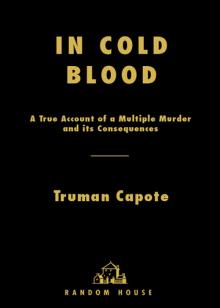 In Cold Blood
In Cold Blood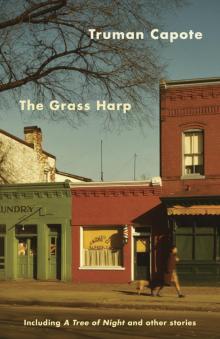 The Grass Harp, Including a Tree of Night and Other Stories
The Grass Harp, Including a Tree of Night and Other Stories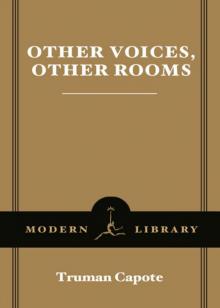 Other Voices, Other Rooms
Other Voices, Other Rooms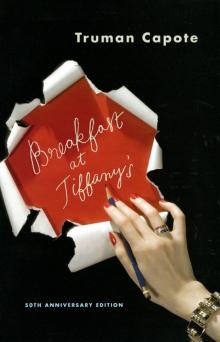 Breakfast at Tiffany's
Breakfast at Tiffany's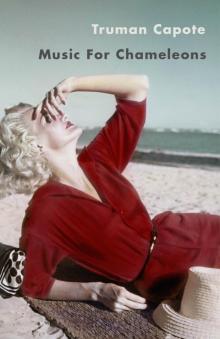 Music For Chameleons
Music For Chameleons A Christmas Memory, Including One Christmas and the Thanksgiving Visitor
A Christmas Memory, Including One Christmas and the Thanksgiving Visitor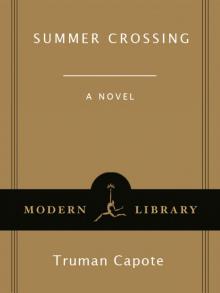 Summer Crossing
Summer Crossing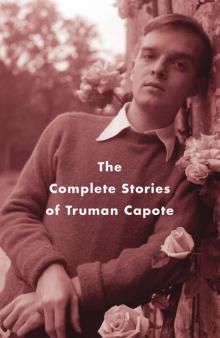 The Complete Stories of Truman Capote
The Complete Stories of Truman Capote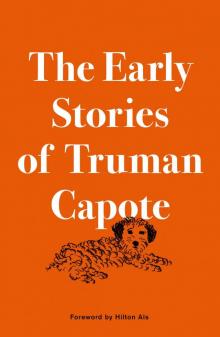 The Early Stories of Truman Capote
The Early Stories of Truman Capote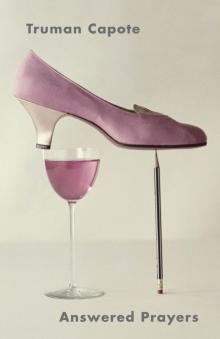 Answered Prayers
Answered Prayers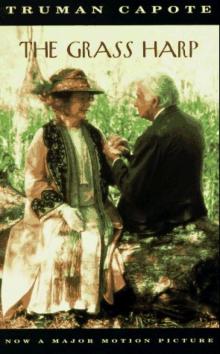 The Grass Harp
The Grass Harp SSC (2004) The Complete Stories of Truman Capote
SSC (2004) The Complete Stories of Truman Capote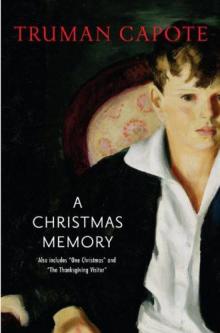 A Christmas Memory
A Christmas Memory